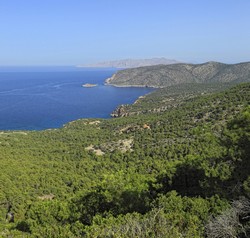Ecosystem shift in Mediterranean ecosystems
Mechanisms behind MTEs resilience under interacting disturbance regimes are not well understood. The EU-funded project RESCRI filled this knowledge gap by evaluating ecological mechanisms governing systems behaviour and the occurrence of alternative states in MTEs under compound regimes of fire and drought. The work aimed to increase scientists’ ability to predict changes to ecosystems to aid in developing adaptive management policies that address environmental threats. A novel model that includes major vegetation properties and the interacting effects of fire and drought was developed. Modelling experiments were conducted using scenario-based approaches to determine how changes in fire and drought regimes, and their interaction, may undermine the resilience of MTEs, especially in relation to trait composition (tree seeder vs. tree resprouter) and ecosystem state (forest vs. non-forest). Multiple scenarios for fire and drought regimes were defined, spanning from 15 to 200 year disturbance frequency. These scenarios involved contrasted fire regimes of large-infrequent and small-frequent fires, and mixed regimes including a combination of large-infrequent and small-frequent fires. Drought scenarios were derived from the combination of the frequency of drought occurrence and the duration in years of the drought events. Results suggest that interaction between moderate fire and drought recurrences generate heterogeneous mosaic-like landscapes in which different vegetation types (forests and shrublands) coexist. However, shrubland expansion is favoured by increases in drought recurrence and fire-drought interactions, highlighting the potential for important vegetation changes in MTEs under climate change. Scientists also discovered that the interacting effects of fire and drought regimes effectively control the resilience of the system and the existence of tipping points of ecosystem state, from forest to non-forest. Specific sequences of fire and drought events, even under moderate recurrence of individual disturbances, are a strong enough mechanism to promote ecosystem shifts. RESCRI represents a major advance in understanding the effects of disturbance interactions on MTEs dynamics and resilience. Its results will inform conservation strategies and help maintain ecosystem services in Mediterranean areas. The framework developed may also be used to increase the predictability of the effects of global change across a wide range of ecosystems.







